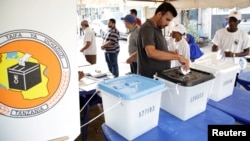Tanzanian authorities are cracking down on the opposition after they called for new elections and protests to challenge a flawed presidential election held October 28. Indeed, the main opposition presidential candidate Tundu Lissu was arrested and then released, according to press reports.
Secretary of State Mike Pompeo, said on Twitter: “We are deeply concerned by reports of election irregularities, politically motivated arrests, and violence during Tanzania’s elections. . . We urge authorities to fully address concerns of irregularities and will review allegations of the use of force against civilians.”
“These irregularities call into question Tanzania’s commitment to democratic values,” said State Department Deputy Spokesperson Cale Brown.
While the Tanzania Election Commission declared President John Magufuli the winner of the presidential contest, the United States remains deeply troubled by the impact of the irregularities, arrests, and violence on the results.
The U.S. continues to urge restraint by all parties and peaceful resolution of any disputes. Tanzanian authorities need to investigate allegations of irregularities and violence by security forces and ensure that all candidates can peacefully address electoral disputes.
The United States calls on the government of Tanzania to respect the human rights and fundamental freedoms of all, including their freedoms of expression and association and the right of peaceful assembly, and to promote internet freedom and free and open access to information.
The United States, in coordination with its partners, will consider visa restrictions, as appropriate, to hold accountable those responsible for human rights abuses and election interference.
“The Tanzanian people, like people everywhere, deserve transparent and accountable governance, equal treatment under the law, and the ability to exercise their rights without fear of retribution,” said Deputy spokesperson Brown.
In order for U.S.-Tanzanian relations to prosper, all stakeholders in the political process must be represented and able to exercise their human rights and fundamental freedoms.














